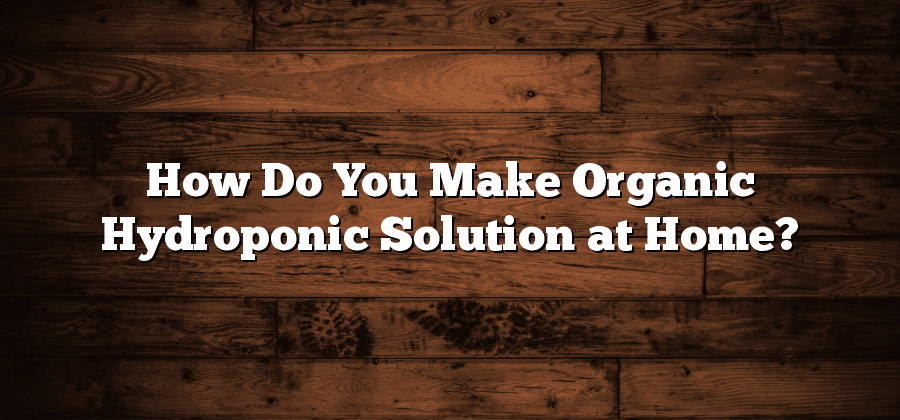Understanding the Basics of Organic Hydroponic Solutions
Hydroponics is a method of growing plants without using soil. Instead, plants are grown in a nutrient-rich solution that delivers all the essential elements they need for healthy growth. Organic hydroponic solutions take this a step further by utilizing natural and organic inputs to nourish the plants. The focus is on sustainability and minimizing the use of synthetic chemicals.
Organic hydroponic solutions can be made from a variety of ingredients, such as compost tea, kelp extracts, and fish emulsion. These ingredients provide the necessary nutrients for plant growth, including nitrogen, phosphorus, and potassium. By using organic inputs, growers can ensure that their plants are free from harmful pesticides and synthetic fertilizers, resulting in healthier and more nutritious produce.
It’s important to note that organic hydroponic solutions require proper monitoring and maintenance. Since plants rely solely on the nutrient solution for their nourishment, it is crucial to regularly check the solution’s pH and nutrient levels to ensure optimal plant growth. Additionally, clean and sterile equipment is essential to prevent the growth of harmful pathogens and maintain the integrity of the organic inputs.
In conclusion, understanding the basics of organic hydroponic solutions is vital for anyone interested in sustainable and chemical-free gardening. By utilizing organic inputs and maintaining proper nutrient levels, growers can achieve healthier plants and produce. In the following sections, we will explore the different organic nutrient options available for hydroponics, as well as provide recipes for homemade organic hydroponic solutions.
Selecting the Right Organic Nutrients for Hydroponics
When it comes to hydroponics, selecting the right organic nutrients is crucial for the health and growth of your plants. Organic nutrients are derived from natural sources such as fish emulsion, kelp meal, and compost, providing a rich blend of essential minerals and trace elements. These nutrients not only nourish your plants but also promote the overall health of your hydroponic system.
One key factor to consider when selecting organic nutrients for hydroponics is the NPK ratio. NPK stands for nitrogen (N), phosphorus (P), and potassium (K) – three vital components that plants need for proper growth. Different plants have varying nutrient requirements, so it is important to choose a nutrient formula that matches their specific needs. For example, leafy greens like lettuce and spinach generally require higher nitrogen levels for lush foliage, while fruiting plants like tomatoes and peppers thrive on higher potassium levels for abundant fruit production.
Exploring Different Organic Hydroponic Solution Recipes
In the world of organic hydroponics, there is a wide variety of solution recipes available for gardening enthusiasts. These recipes utilize organic ingredients to provide the necessary nutrients for thriving plants. One popular recipe involves using seaweed extract, fish emulsion, and liquid kelp as a nutrient base. The combination of these natural ingredients provides a rich source of minerals and helps promote healthy growth in plants. Another recipe that is gaining popularity involves the use of compost tea as a hydroponic solution. This recipe uses compost and water to create a nutrient-rich brew that can be added directly to the hydroponic system. Compost tea is known for its ability to improve soil structure, promote beneficial microbial activity, and enhance plant growth.
When exploring different organic hydroponic solution recipes, it is important to consider the specific needs and preferences of your plants. Some plants may require additional nutrients, such as calcium, magnesium, or iron, which can be incorporated into the solution. It is also important to ensure that the recipe provides a balanced combination of nutrients, as an excess or deficiency of certain elements can negatively impact plant health. Additionally, consider the availability and affordability of the ingredients needed for the recipe. While organic hydroponic solutions can be highly effective, it is crucial to source organic ingredients from reputable suppliers to ensure their quality and purity. By experimenting with different recipes and fine-tuning the nutrient composition, organic hydroponic gardeners can achieve optimal plant growth and yield while maintaining an environmentally friendly approach.
Sourcing Organic Ingredients for Homemade Hydroponic Solutions
Finding and sourcing organic ingredients for your homemade hydroponic solutions is an essential step towards creating a truly sustainable and eco-friendly system. With the increasing demand for organic produce, it is crucial to use organic nutrients and ingredients to ensure the highest quality and safest end product. But where can you find these organic ingredients?
One option is to visit your local organic grocery store or farmers market. These outlets often carry a wide range of organic products, including fertilizers, amendments, and supplements specifically designed for hydroponic systems. Look for organic fertilizers that are certified by reputable organizations to guarantee their authenticity. Additionally, you can explore online retailers that specialize in organic hydroponic supplies. They offer a convenient way to access a variety of organic ingredients, often providing detailed information and customer reviews to help you make an informed decision.






